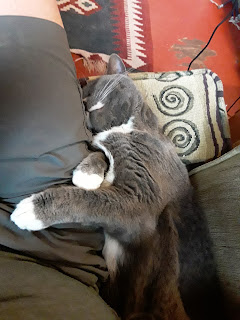Not long ago, a friend of mine sought advice on Facebook. Should he adopt a promising-sounding young cat that was listed at the local animal shelter?
Go for it, his many kind-hearted friends advised him. Adopt the cat!
Some of us – I’ll call us the advocates of the Random Cat Principle -- went one step further. If that particular cat has already found a home, we advised, adopt whatever cat is there -- any cat at all.
The Random Cat Principle got me thinking -- and ultimately set me to writing a blog post that is sneakily more about people than it is about pets.
But first, cats.
Four years ago, a few months after our beloved Pippin died at the age of nineteen, the twins convinced us to head to the shelter as a family to get another cat. They’d already picked out a name, Sinbad, based on a cat-character in a favorite novel. As it turned out, there was only one cat at the Fairbanks North Star Borough Animal Shelter that morning. Thus, she became our cat. That was the entire equation for the application of the Random Cat Principle: here is a cat, she needs love, we want a cat to love – therefore, she is Sinbad, and we love her. Four years later, that love has never fallen into any doubt.
What’s interesting about this anecdote is not that it’s unusual, but that it isn’t.
Love. Between one human and another, that word has a lot of blurred-yet-weighty meanings that include not only enjoying and appreciating someone’s particular qualities, but also genetics, guilt-trips, candlelit dinners, callipygian tendencies, dependence, hero-worship, obsession, country songs, and cringy rom-coms. Sometimes we talk about love as if it were an emotion over which we have no control, as in “falling in love”. In other contexts, it’s an emotion we assign based on objective merit, as in, “My friend always brings pizza; I totally love him!”
Loving a pet is easier to parse. I am not genetically related to Sinbad, except in the sense that I am also genetically related to chimpanzees, weevils, and bananas. My obligations are entirely chosen, and she (being a cat) feels none. I do not worship her, and she (being a cat) does not worship me. I am happy to report that our connection does not involve romance or lust. I appreciate many of Sinbad’s particular qualities (she’s curious, fuzzy, and affectionate) and she seems to enjoy some of mine (I’m playful, cuddly, and am willing to open and close doors a lot). Yes, it now seems to me that she is a superlative cat. But I’ve found likeable qualities in every cat I’ve ever lived with -- and every dog, and every orphaned squirrel. My statistical heart knows that this is not Lake Woebegone, where all the critters are above average. I see everything that is wonderful about Sinbad because I love her, rather than the other way around.
People are more complicated than cats. There’s nothing wrong with that; I enjoy having a brain that’s weightier than a AA battery. As such, we humans reserve the right to select our friends – people who are intelligent, kind, generous, quick-witted, empathetic, supportive, funny, creative, energetic, thoughtful, wise, or good at making vegetarian burritos. All that choice is empowering, but it can also be confusing and worrisome. If we love others for their desirable qualities, are we merely being self-serving? If others love us for our homologous paternal chromosomes, our excellent knock-knock jokes, or our sculpted thighs, is that love transactional and impermanent? Forced and coerced?
The Random Cat Principle reassures us that love is something we choose to do. It’s something we undertake and create. Yes, we often (but not always) choose whom to love in a non-random way, but ultimately love is something we can build and rebuild, using magical fairy dust made from time, neural connections, and free will. Love is a superpower
Superpowers don’t come cheap. As a never-ending act of doing, creating, and rebuilding, love is the most expensive undertaking of our lives. It comes with huge unavoidable risks. Sometimes love is not reciprocated. Sometimes it needs to be ended, and sometimes it ends too soon. To love someone – even somecat -- is to set yourself up for work, frustration, disappointment, and devastation. We suffer and ruminate over our failures and losses, but we rarely give ourselves enough credit for our successes, our ability to discover and nourish the good in others, our astonishing acts of creation. We rarely give ourselves credit for the quirky beauty of the Random Cat Principle.
My friend went to the shelter. The young cat he’d had in mind had already been adopted by someone else. A different cat was there -- an older black cat of entirely unknown qualities. A cat that needed a home.
My friend now has a cat, and the cat has him, and they love one another.

Enjoyed this! Now I need to give more thought about “Random Cat Principle” and why I love what I love.
ReplyDelete